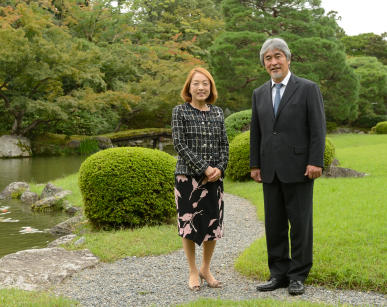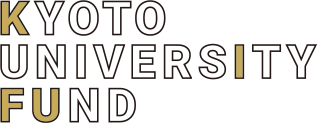Vol.6 Interview
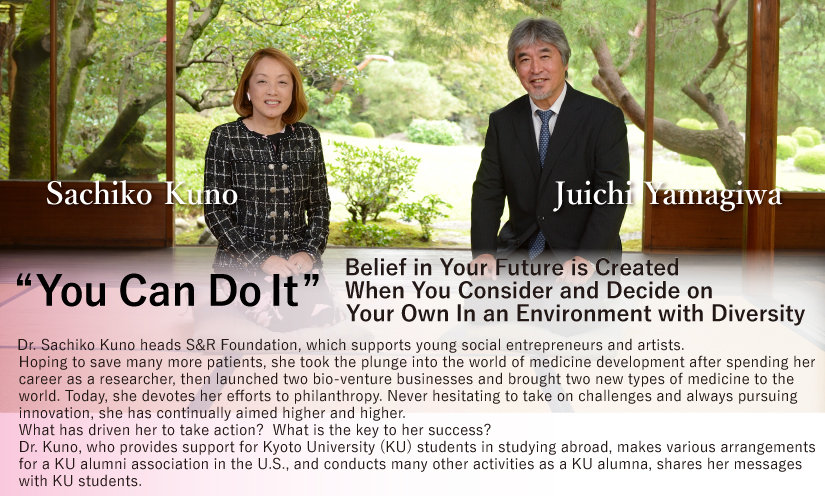
Dr. Sachiko Kuno
S&R Foundation President and CEO
Born in 1954, Kudamatsu City, Yamaguchi Prefecture. Graduated from the Faculty of Engineering, Kyoto University, in 1977. Went to Germany in 1981 to study at the Technical University of Munich. Completed a doctoral course in 1983 at the Graduate School of Engineering, Kyoto University. Holds a Phd. in Biochemical Engineering. Joined the Research Development Corporation of Japan (currently the Japan Science and Technology Agency) in 1983 to conduct research in the field of life sciences.
In 1989, Dr. Kuno established R-Tech Ueno Ltd. for the purpose of researching, developing, manufacturing and selling pharmaceuticals. The company succeeded in developing Rescula®, an eye drop product to treat glaucoma and ocular hypertension, and placed it on the Japanese market in 1994 ahead of the other countries in the world. This was the first pharmaceutical based on prostones, which had been discovered in the 1980s by Dr. Kuno's partner, Dr. Ryuji Ueno. In 1996, together with Dr. Ueno, she launched Sucampo Pharmaceuticals Inc. in the U.S., and began to serve as the company's CEO and work on developing and commercializing new pharmaceuticals. In 2006, the new company successfully obtained approval from the U.S. Food and Drug Administration (FDA) to sell AMITIZA®, the second pharmaceutical based on prostones, as a therapeutic agent for chronic idiopathic constipation.
In 2012, Dr. Kuno became a co-founder of her third medicine development venture, VLP Therapeutics, which strives to develop innovative vaccines.
At the same time, in 2000, she established S&R Foundation to provide support for young scientists and artists. As president of the foundation, she is now engaged in a wide variety of philanthropic activities.
She was the only Japanese listed by Forbes in 2015 as one of the 50 most successful self-made women in America.
Studying in Germany
Life-changing Experience Making Her Realize Her Own Forte
YamagiwaWhen I was enrolled in the Faculty of Science of Kyoto University in 1970, there were only six female students out of a total of 300. Considering that you are only two years younger than I, I imagine the situation at the Faculty of Engineering was similar. I assume that the Faculty of Engineering was not that appealing to girls in those days, but why did you select that faculty?
KunoPartly because I loved studying so-called STEM subjects, and also because my sister was a student of the KU Faculty of Engineering. In addition, when I was a child, I was not so sociable and decided to pursue my career in research, expecting that I wouldn't have to associate with many people. At the Faculty of Engineering in those days, there were only six female students out of a total of 1,000.
YamagiwaIn that environment, you went on to graduate school to become a researcher. Moreover, when you were on your doctoral course, you went to Germany to study.
Kuno Prof. Saburo Fukui, one of the professors I respected the most, was concerned that I was aiming to become a researcher in an almost all-male environment, and recommended me as a research assistant at the Technical University of Munich.
Yamagiwa Considering that there were few female researchers in Japan, and there were no email or other convenient communication tools available in those days, your decision must have entailed a lot of courage.
Kuno I took the plunge into a new world, where there were many female students and researchers, and they were all conducting research as they liked. Thanks to the position I had assumed at that time, I was able to earn some income, though it was small. When I delivered a lecture at another university, for example, even though I was on a doctoral course in those days, I was able to receive a lecturer's fee. I feel that these experiences spurred my decision to pursue my career in research.
I also think that the environment where I needed to blaze a trail on my own actually ended up working positively for me. Although I had not been good at giving presentations and other types of communication, I feel that I improved my skills a lot in these fields. Studying in Germany was a life-changing experience for me.
Yamagiwa I can relate to a lot of what you say. In my case, I changed my research target from the Japanese monkey to the gorilla, and then began to go to Africa and stay there for a few months at a time. In that environment, where there were no Japanese people around me, I learned a lot, such as negotiation skills and decisiveness.
Kuno If you are in a new environment and experience slight stress, you sometimes discover your own "forte."
Yamagiwa What was the capability that you discovered?
Kuno It was resistance to loneliness. I like considering things on my own. Even if I make a decision on my own, I can somehow work things out.
Yamagiwa Actually, resistance to loneliness is very important. In this world of ICT, you're always connected online, meaning that you always have someone to consult. Accordingly, many more young people today cannot consider or decide on their own, and this is a problem.
Kuno I feel that when I decided something in those days, there were two of me: the one who asked questions and the other who answered them. Such training that I had when I was young now helps me a lot.
From Researcher to Medicine Development Business Entrepreneur
Key to Success: Do It until It Succeeds
Yamagiwa You experienced a lot in Germany, so what happened after you returned to Japan?
Kuno After returning to Japan, I earned a biochemical engineering Ph. D, and began to work as a special researcher for the Osamu Hayaishi Bio-information Transfer Project of the Research Development Corporation of Japan (currently, the Japan Science and Technology Agency). There I met with Dr. Ryuji Ueno, who would later become my partner.
Yamagiwa I hear that you were confident that the prostones hypothesis, which Dr. Ueno had already formulated in those days, was correct.
Kuno The hypothesis held that prostones, a class of functional fatty acids that Dr. Ueno had discovered, had a special role in the process of repairing the central nervous system and cells. Feeling that it was a big discovery, I thought about what needed to be done to prove the theory as soon as possible.
Yamagiwa That was why you left the Research Development Corporation of Japan, and founded R-Tech Ueno Ltd. in 1989, wasn't it? That was what we now call a bioventure. Did you feel any hesitation about changing your career from a researcher to an entrepreneur of a medicine development business?
Kuno I thought that I had better develop medicine that was useful to patients, rather than conducting basic research at university or other institutes.
Yamagiwa I hear that your biggest problem was financing.
Kuno In those days, there was no venture capital. Accordingly, we sought research sponsorship from Ueno Fine Chemicals Industry, Ltd. where Dr. Ueno's father served as president. We spent about 8 billion yen before succeeding in developing a medicine. Although we eventually managed to obtain approval and launch the medicine on the market, Ueno Fine Chemicals Industry, Ltd. did not finance our second attempt to develop medicine. So, we took the risk of moving to the U.S. in 1996 and founded our second bioventure, Sucampo Pharmaceuticals.
Yamagiwa Despite your problem with funding, you eventually managed to develop and launch your new medicine. What do you think was the key to your success?
Kuno Looking back now, the key to success is very simple. It's to "do it until it succeeds."
Yamagiwa Sounds very interesting. Do you mean "not to give up"?
Kuno I feel that it's slightly different. What matters is your feeling that you can see the top of the mountain. In our case, we knew that if we reached the top of the mountain, we would be able to develop our new medicine. Even if some clouds hide the top of the mountain while you're trying to reach there, you'll be able to imagine the top of the mountain.
Yamagiwa Since you were able to see the top of the mountain, you did not give up. I see.
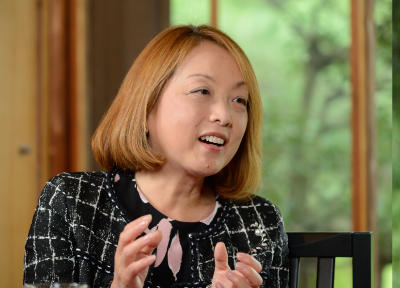
Don't Be Discouraged by Mistakes
Take Small Steps toward a Big Vision
Yamagiwa Although you say that the key is to "do it until it succeeds," it's never a walk in the park, especially if you aim higher, and this is true of research. The only way to reach your goal is to ask yourself many small questions and solve each of them. You sometimes don't really feel that you're approaching the goal, which makes you feel frustrated and doubtful about the target itself.
Kuno After all, all you can do is continue taking small steps, while always checking your big vision. According to one researcher, the more small steps you take, the less likely you'll feel doubt about your big vision, whether it ends in success or failure.
Also, if you try to jump over a big hurdle at the first attempt, and make a mistake, you'll suffer a serious blow, making you hesitate about taking further risks due to fear of further damage. But if you train yourself to jump over small hurdles, you'll sustain only minor damage even if you make a mistake, and also, you'll gradually learn how to prevent damage.
Yamagiwa What about you? Did you have any experience of making a big mistake?
Kuno Well, I guess I did, but I don't remember, because even after making a mistake, I soon found the next target and took a step forward to it.
Yamagiwa Excellent! I've developed the concept of "WINDOW," with "O" standing for "Original & Optimistic." If you have any original idea different from others', you might sometimes be criticized or rejected by others. To maintain your motivation even in that environment, it's truly important to be optimistic. Perhaps you are optimistic in a way.
Kuno I get that a lot. Also, I'm often told that I'm nimble, able to move quickly and easily, because I can change my decision quickly, once I think that it's not right. I feel that this is a valuable quality.
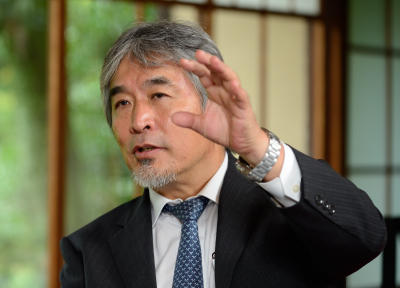
Consider, Decide, and Act on Your Own
Accumulation of This Process Leads to Your Self-Efficacy―"You Can Do It"
Kuno Even though I had 8 billion yen in debt and faced other experiences that might be unbearable for other people, I didn't feel it was so unbearable. Wondering why I didn't feel that way, I researched and found that probably it was largely due to "self-efficacy."
Yamagiwa Efficacy?
Kuno Yes. While self-confidence is obtained based on something you did in your past, self-efficacy concerns the feeling that "you can do it," namely your belief in your future-self. I have a number of experiences of feeling without any ground that I could make it.
Yamagiwa Where do you think your self-efficacy came from?
Kuno As one of the six female students out of a total of 1,000, and also as an international student, I considered, decided, and acted on my own. I feel that this gave me confidence, and enabled me to believe in my future-self.
Yamagiwa Konosuke Matsushita once said that one of the qualifications for your future success is that your look lucky. If you look lucky, it's reflected in your persona, making people feel like following you. In your case, I guess you continued to move straight toward your goal based on the self-efficacy that you had developed, exuding a persona that made you look lucky, and this might have resulted in the support that was extended to you.
Kuno Yes, I think so. I myself was free of any hesitation when taking steps forward, but at the same time, I was blessed with people who gave me support both materially and mentally.
Yamagiwa Another important point is how you look to prospective investors.
Kuno That might be true, but looking back my long career as a fundraiser, I can say that you're less likely to get funding especially when you need it. I feel that you can attract luck in terms of investors and other matters, only after you are determined that "even if nobody supports me and I'm the only one, I will definitely do this." I call such determination a "pure mind."
Yamagiwa I see. In 2022, KU will celebrate its 125th anniversary, and we'll raise funding for commemorative projects. We need to learn from your comments.
Innovation Requires
Open Environment with Diversity
Yamagiwa Currently, you're working actively as the head of S&R Foundation, which provides support for social entrepreneurs and artists. I hear that the concept of the foundation is to make the world even better by creating innovation and social impact. In the U.S., philanthropy has developed into a wide variety of forms.
Kuno In the U.S., as a result of the reflection on the profit-first business model prior to the bankruptcy of Lehman Brothers, business focus is now being placed on a simultaneous pursuit of not only economic return but also social return.
Yamagiwa Donations have already been a part of the U.S. culture, so what's the difference?
Kuno Taking the concept one step further, the new style strives to establish sustainable business models for projects carried out so far based on donations.
Yamagiwa In a wide variety of trends of the times, innovation is now required in every field. Actually, "I" in the KU WINDOW concept stands for "International & Innovative," but how to create innovation is a serious challenge. What do you think is necessary for innovation?
Kuno To put it bluntly, it's an open environment with diversity. First of all, it's impossible to tell how to create innovation. In this day and age when the amount of information is increasing exponentially, our knowledge becomes soon obsolete, making it difficult to pass on our knowledge to the next generation. The only thing we can do is to establish an environment where innovation can be created. At our foundation, we provide part of our historical structure, where our headquarters is located, as housing for young, talented and diverse people, such as artists, scientists, and those who'd like to start business. We do this partly because we'd like to establish an environment for innovation.
Yamagiwa Why is innovation created in an open environment with diversity?
Kuno The more diverse people you have around you, the more stress you'll suffer. But reflecting on my own experience of studying in Germany, I feel that slight stress is good for people. If your environment is too comfortable, you'll be less innovative.
Yamagiwa Quite so! It's said that the reason why innovation has not been created in Japan is that the country was stable from the second half of the 1970s to the 1990s.
Kuno A feeling of tension is an important element. I think that there is a similar environment at KU.
Yamagiwa Under the WINDOW concept, the university is positioned as a "window." As this concept shows, what we're aiming for is exactly openness and diversity. In addition, a little more feeling of tension might be also necessary.
Encounter Various People and Worlds
Unleash Yourself and Fly off
Yamagiwa You provide full support to the Global Leadership Program, in which about 10 KU students go to Washington DC every year, and stay in the same place together for a short period of time, while visiting various international agencies and universities. In addition, the Kuno Award has been recently established thanks to donations from your mother Yuko, for the purpose of granting scholarships for female STEM students. I would like to express my appreciation for your generous support to our students. What do you feel when you are with KU students today?
Kuno They study much harder than we did when we were students. Possessing a great wealth of knowledge and sophisticated manners, KU students are highly valued in Washington. If I needed to find something negative about them, I'd say that they tend to hesitate to make decisions on their own and try something new.
Yamagiwa That's right. I feel that not only KU students, but also other students today tend to be pessimistic about the future, rather than the present. Experiencing sluggish economic growth, they don't expect that they will have a better life in the future. Trying to maintain the happiness that they have now, they take a defensive stance.
Kuno I feel that to break with the status quo, they need to meet a wide variety of people and know different worlds. Even though they feel that they're happy now, there might be another form of happiness. So, I'd like them to study abroad in their school days even if it's only for a short period, and realize that their lives are full of diversity.
I often tell students who participate in the program to "unleash" and "unlock."
Yamagiwa I see. Undo the leash and the lock.
Kuno Everybody has a high potential, but when trying something new, they shrink back, feeling as if there was a wall right in front of them. They're just leashed, and the reality is that there's no wall in front of them.
Yamagiwa Who grasps the leash?
Kuno Themselves in a sense, but their parents and other family members in another sense.
Yamagiwa The other day, when I talked with the principals of girls' high schools in Tokyo, I was told that the parents of female high school students today don't want to let their children go. The principals went on to say that even if such parents felt that KU was attractive, they didn't want to allow their children to go to KU. I think that this is an example of what you're saying.
Kuno In any case, you're the only one who can cut your leash. I often tell students to cut the leash quickly and move ahead. But if you begin to run too frenetically, you might get injured, so you need to control your own walking speed and running speed. Once you're able to do that, there's nothing to fear.
Yamagiwa If students can listen to such a story abroad, it follows that they will be greatly motivated. When they return to Japan, they will have developed greatly, gaining a lot of confidence, willingness to take on new challenges, decisiveness, etc. I'd like to ask you to continue to provide us cooperation in offering valuable opportunities to KU students.
